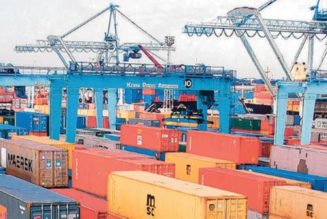Boss Talk
Maurice Akech: NCA executive director on fighting the menace of collapsed buildings in Kenya
Friday July 14 2023
National Construction Authority executive director, Maurice Akech. ILLUSTRATION | JOSEPH BARASA | NMG
Cases of injuries and death from condemned and compromised buildings are rife, turning the spotlight on the performance of contractors and the industry regulator, the National Construction Authority (NCA).
The Business Daily spoke to NCA executive director Maurice Akech on the menace of collapsing buildings, dealing with rogue contractors and the updated building code.
What is the missing link, from where you sit?
Coordination and collaboration among the players in the sector are key to ensuring that we get everything right.
We have started addressing this through multi-agency collaboration in our activities, including working with county governments, regulators like Nema [National Environment Management Authority] and the enforcement unit like the police.
We move as a team and carry out joint operations or a joint inspection. By the time we visit a site, we have received numerous reports on non-compliance issues on a building that need to be addressed. Previously, there was a lack of proper coordination to address those issues.
How many quack contractors have the NCA prosecuted to date for practising without a registration certificate?
The construction industry has many players, and the NCA directly licenses contractors and accredits construction workers and site supervisors.
The law empowers NCA to take action against contractors that breach the standard requirement for construction.
The board of the NCA carries out an enquiry which is like a quasi-judicial process, leading to certain actions after the findings and recommendations.
Over the past four years, we have had 36 inquiries following collapses that have caused either death or injuries for which 50 percent of contractors have been suspended, with the longest period being 36 months.
Suspended contractors are denied business and the projects they are handling are stopped. After the period lapses, they have to apply afresh to be considered back into the register.
Others have been cautioned based on the weight of the findings and those found not culpable have been let go. The law was amended in 2020, giving us additional enforcement powers where we can initiate a charge against a rogue development, and the Director of Public Prosecutions (DPP) will prosecute the culprit in court.
How many contractors and skilled labourers are there in Kenya?
NCA has existed for 10 years and the register has a total of 70,000 contractors. These belong to different categories based on the size of projects they handle.
Category one comprises contractors that do buildings whose contract value is over Sh500 million, while category eight, which is the smallest contractor, can only do a project whose value is Sh5 million.
The contractors also fall into five classes based on the kind of work they can do; building works, road works, water works, electrical works and mechanical works.
Around 37 percent of the contractors are in the building works class, 35 percent in the road works, 20 percent in water works, 5.0 percent in electrical and mechanical 3.0 percent. Others come in as sub-contractors.
How many of the 70,000 contractors have valid licences and what is the mix of foreign and local contractors?
This list of contractors is published twice every year in the Kenya Gazette. Only about 22,000 of the 70,000 contractors have valid practising licences. Renewal is done annually.
Out of the 22,000, we have just 100 foreign contractors. Foreign contractors can only be registered under category one. Categories two to eight are ring-fenced for local contractors.
During their application, the foreigners should demonstrate that they have identified a local contractor or consortium who will be their partner either as a joint venture or as a sub-contractor to the tune of 30 percent of that contract.
This is a way of building local capacity and means of technology transfer. Finally, a foreign contractor can only be registered based on a project they have been awarded and must swear an affidavit that they will wind up and move back at the end of the project.
Status of accredited skilled construction workers?
In our database, we have more than 400,000 construction workers. These are people we have been able to identify as engaged in construction activities on a day-to-day basis.
They fall into three categories, namely skilled, semi-skilled and unskilled. Out of the 400,000, some 135,000 are skilled construction workers and these are the people with NCA accreditation cards.
Of these 135,000, around 21,000 are site supervisors (foremen) and about 114,000 are skilled construction workers in different trades.
There are a total of 56 trades in the construction industry including mason, steel-fixer, tiller, carpenter and plasterer.
What are NCA’s greatest achievements to date?
They are numerous. On the regulatory aspect, we have been able to publish the register of all contractors so they can do a quality job.
We’ve developed a code of conduct for the construction industry that guides the roles and responsibilities of the various players in the construction value chain.
We developed a skill-transfer framework for foreign contractors such that it is not haphazard and can be traced.
We expect to publish a building code replacing the one developed in 1968 by the first quarter of the financial year starting July. All our services are offered on automated platforms.
How are you faring in the collection of fees amounting to Sh1.7 billion from real estate developers that accrued before the scrapping of the construction levy in 2017?
In the NCA Act, there is a provision for the collection of a construction levy. The regulations were approved by Parliament in 2014 and we started collecting construction levies.
However, in 2017, the process was set aside through an executive order to minimize the burden of doing business.
At the time, we had raised some invoices to the tune of Sh1.7 billion for the people who had applied for project registration.
The requirement was that for every project whose contract value is above Sh5 million, NCA was collecting 0.5 per cent.
The moment this communication went out, even the people with invoices decided they won’t pay. So in our books, this appeared as income but it is a debt that was never collected.
Over 70 per cent of that money is in the hands of public institutions. We are now working on a formula to see how we can amicably close this because in our books it exists but in reality, it may not be collectible.
The PFM Act has provisions on how to deal with this.
What was the outcome of your search for a debt collector to handle this debt?
When we went out there, we were looking for someone to help us collect this. It was non-responsive so it was terminated.
The NCA had mentioned plans of establishing the National Construction Institute in its strategic plan. What’s the progress thus far?
In Konza City, we have been allocated three parcels of land and that is the place where the institute is supposed to be built.
Note that one of our functions is to develop and build capacity in the construction industry in Kenya. We have thus renamed NCI to Centre for Construction Industry Development (CCID) so it can offer training, research and advisory.
The centre is also going to offer support for East Africa and beyond. We have concluded the feasibility studies, done the architectural designs, prepared the bill of quantities and onboarded environmental consultants to do the green reviews.
As a regulator, we advocate for social and environmental sustainability. The next stage is groundbreaking.









